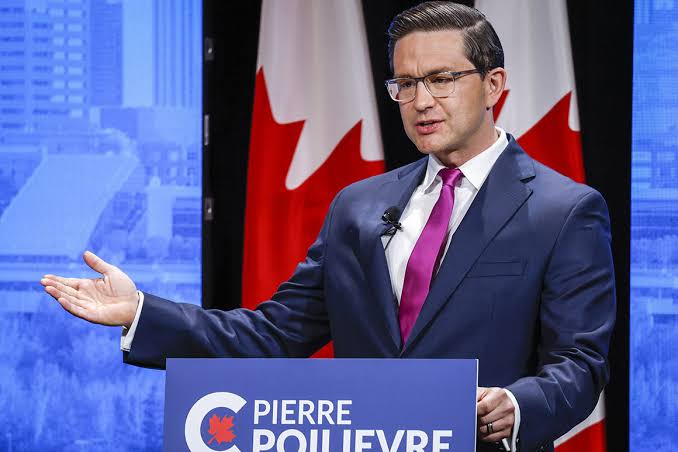“Poilievre Sparks Controversy by Vowing to Fire Bank of Canada Governor Over Inflation”
Poilievre Sparks Controversy by Vowing to Fire Bank of Canada Governor Over Inflation
Conservative Party leader Pierre Poilievre ignited a political firestorm after declaring that he would dismiss the Governor of the Bank of Canada if elected Prime Minister, blaming the institution for the country’s persistent inflation crisis. The controversial statement has drawn sharp criticism from economists, political analysts, and rival politicians, who argue that his approach threatens the independence of one of Canada’s most trusted financial institutions.
The Statement That Started It All
In a press conference held during his leadership campaign, Poilievre openly accused the Bank of Canada of “failing Canadians” and “printing cash for the Trudeau government,” referring to the bank’s policy of quantitative easing during the COVID-19 pandemic. He vowed that under his leadership, there would be a complete shift in how Canada’s monetary policy is governed.
“The Bank of Canada has become an ATM for Justin Trudeau’s out-of-control spending,” Poilievre said. “They caused inflation with their reckless money printing. If I’m Prime Minister, I will fire the Governor and restore monetary discipline.”
The Governor in question, Tiff Macklem, has served since 2020 and was appointed by the federal government. While the Bank of Canada is a Crown corporation, it operates independently of direct political control — a design intended to insulate it from short-term political pressures.
Reaction From Economists
Poilievre’s comments quickly provoked strong backlash from Canadian and international economists, many of whom warned that the politicization of the central bank could have serious consequences.
“Threatening to fire the Governor undermines the very foundation of central bank independence,” said Kevin Milligan, an economics professor at the University of British Columbia. “Once you open that door, markets start to worry about whether interest rate decisions are being made based on economics or politics.”
The Bank of Canada, like most central banks in developed economies, is tasked with managing inflation and maintaining financial stability. While its tools — such as interest rates and bond-buying programs — are sometimes controversial, most experts agree that an independent central bank is essential for long-term economic credibility.
Political Fallout
Leaders across the political spectrum condemned Poilievre’s remarks. Prime Minister Justin Trudeau accused the Conservative leader of “playing with fire” and “undermining the trust Canadians have in their financial institutions.” Finance Minister Chrystia Freeland added that Poilievre’s statements could “spook investors and weaken the dollar.”
New Democratic Party (NDP) leader Jagmeet Singh also criticized Poilievre, though from a different angle, stating that the Conservative leader was scapegoating the Bank to distract from “real issues like corporate profiteering and wealth inequality.”
In response to the backlash, Poilievre doubled down, claiming that criticism was evidence that the “Liberal elite” and “corporate media” are afraid of change. “The insiders are circling the wagons because I’m threatening their grip on power,” he said in a follow-up campaign video.
Central Bank’s Defense
The Bank of Canada itself issued a rare statement in response, reaffirming its independence and role in maintaining inflation targets.
“We operate within a framework established by Parliament,” the statement read. “Our decisions are based on data and analysis, with the aim of supporting a stable and healthy economy. Political interference would undermine our ability to carry out our mandate effectively.”
Although the Bank of Canada is technically under federal jurisdiction, firing the Governor is not a simple political process. It would require proof of misconduct or incompetence and would likely trigger a constitutional or legal battle.
Public Opinion Divided
While many experts condemned Poilievre’s comments, public opinion is more nuanced. With inflation driving up the cost of groceries, housing, and basic necessities, many Canadians are angry and looking for someone to blame. A recent poll found that 48% of Canadians agreed with the statement that “the Bank of Canada deserves criticism for its handling of inflation.”
For some, Poilievre’s willingness to confront the institution is refreshing. “At least he’s saying what everyone else is thinking,” said a small business owner in Calgary. “We’re the ones paying the price, while they sit in boardrooms making decisions that ruin lives.”
Others, however, are more skeptical. “Firing the Governor won’t fix inflation,” said a Toronto-based teacher. “It just shows he’s willing to politicize anything to win votes.”
Global Implications
International observers are also paying attention. Central banks around the world are closely watching how democratic nations handle political pressures, especially in the post-pandemic era of high inflation and economic uncertainty.
“If Canada sets a precedent of firing a central bank governor for political reasons, it could ripple through the global economy,” said Mohamed El-Erian, chief economic adviser at Allianz. “Other countries might follow suit, and that would erode confidence in the global financial system.”
The International Monetary Fund (IMF) has not commented directly on Poilievre’s remarks but has previously stressed the importance of central bank independence as a pillar of economic stability.
A Preview of a Populist Approach?
Some analysts view Poilievre’s statements as part of a broader populist strategy. Like Donald Trump in the United States or Giorgia Meloni in Italy, Poilievre appears to be positioning himself as an outsider taking on entrenched institutions.
“Poilievre is using classic populist rhetoric: blame the elites, attack the experts, promise drastic change,” said political scientist Jennifer Welsh. “It’s emotionally effective but economically risky.”
This strategy may galvanize his base, but it also alienates moderate voters and raises questions about how he would govern if elected.
The Road Ahead
As Canada heads into the next federal election cycle, Poilievre’s comments on the Bank of Canada may become a defining issue. His willingness to take on powerful institutions will either be seen as courageous reform or reckless populism, depending on who you ask.
What’s certain is that the debate over inflation, monetary policy, and political accountability is far from over. Whether Pierre Poilievre’s bold stance will help or hurt his campaign remains to be seen.
But for now, the Conservative leader has achieved what he likely intended — he’s at the center of the national conversation.





